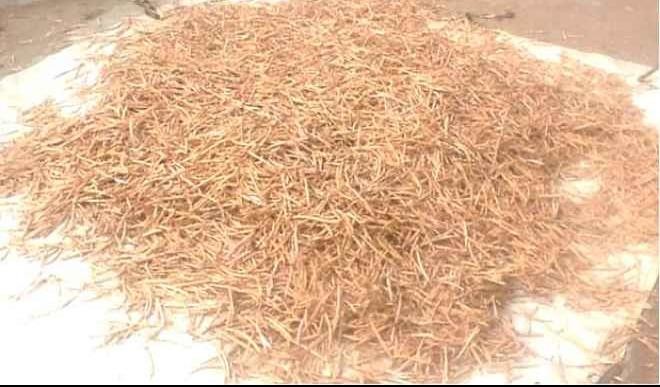New cowpea varieties save Benue from poor harvest
Two new cowpea varieties experimented by farmers in Benue State reportedly saved the state from poor harvest of cowpea this year. Cowpea farmers in the state had earlier expressed fear over what they called insect infestation of their farms. Daily Trust had reported that the tiny black-looking insects had affected the pod bearers, which threatened […]


Two new cowpea varieties experimented by farmers in Benue State reportedly saved the state from poor harvest of cowpea this year.
Cowpea farmers in the state had earlier expressed fear over what they called insect infestation of their farms.
Daily Trust had reported that the tiny black-looking insects had affected the pod bearers, which threatened the seeds.
However, our reporter observed this week that some of the farmers that planted the new varieties of the cowpea were not affected by the infestation.
Daily Trust learnt that the lucky farmers are already planning commercial production of the crop, following the breakthrough recorded in the harvest of the new varieties known as FUAMPEA 1 early maturing and FUAMPEA 2.
The new varieties were developed by a team of scientists from the Federal University of Agriculture (FUAM) in Makurdi.
Mrs Hembadoon Igbaya, a cowpea farmer, who spoke at a field day event, disclosed that the improved seeds have greatly increased her farm yield.
She added that the new varieties tested on her farm have helped in maximising her profit in this year’s harvest.
Igbaya, who corroborated the success stories of some of her colleagues at the event with theme ‘Sustainable and Impact-Oriented Legume Seed Delivering System for Small Holders Cowpea Seed System’, a programme of the International Institute of Tropical Agriculture (IITA) and Federal University of Agriculture Makurdi (FUAM) Tropical Legume III Cowpea Seed System, also indicated interest to expand their farms.
Though she complained about late planting of the seeds as early stoppage of the rain this year affected her yields, the harvest, she maintained, was still encouraging as the profit realized was worth the while.
Meanwhile, Associate Professor of Plant Breeding and Seed Science, Dr. Lucky Omoigui of FUAM, who led the team of scientists that developed the varieties, has called on government and farmers in the country to take advantage of the health and economic opportunities provided by cowpea to invest heavily in the production of the crop in the country.
Omoigui noted that cowpea is an important crop in Nigeria as it provides food and cash for farmers as well as fodder for livestock, adding that the two varieties of the crop, known as FUAMPEA 1 Early maturing and FUAMPEA 2, are aimed at boosting cowpea production in marginal soils and increase in the incomes of farmers in northern Nigeria.
The plant breeder explained that the early maturing variety matured in about 65 days while the medium maturing matured in about 75 days as opposed to the local varieties that mature in 80 to 90 days.
He said the potential for cowpea farming in Benue State is higher than most states in the north, pointing out that “the new varieties have a potential of yielding 1.9 to 2.2 tons per hectare and are resistant to Striga gesnerioides and Alectra vogelii as against most local varieties grown in the country, especially in the upper north, recording a yield of between 400kg and 600kg per hectare.”
Our correspondent reports that the new varieties, officially released by the National Committee on Naming, Registration and Release of Crop Varieties at its 28th meeting held on October 13, 2016 at the National Centre of Genetic Resources and Biotechnology (NACGRAB) Moor Plantation in Ibadan, have improved yield for farmers who were given the seeds in Benue and taught best agronomy practices in the cultivation of the crop.
The varieties were released based on their high yield and resistance to the two noxious parasitic weeds, Striga gesnerioides and Alectra vogelii, that limit cowpea production and productivity in the Northern Guinea, Sudan and Sahel savanna agroecologies of Nigeria.
In his remark, Malam Umar Garba of Kano State Agricultural and Rural Development Authority (KNARDA), said he was happy that cowpea could actually grow very well in Benue State.
Garba said cowpea is consumed worldwide and generates a lot income for producing countries. He urged government to invest more in the crop which has great health value and is also financially greater than rice, maize and other crops.
On his part, Teryima Iorlamen, a Principal Investigator with IITA, told the farmers that the cultivation of cowpea in commercial quantity has come to stay, pointing out that with the success of the programme, there will be huge market for the crop in the state.
He particularly called on women and the youth to take advantage of the programme and go into farming cowpea due to its potentials.
The representative of the district head, Chief Abraham Igyande, said with the breakthrough recorded in the cultivation and harvest of the crop, more farmers in the area will get involved and more land will be made available for cultivation.
